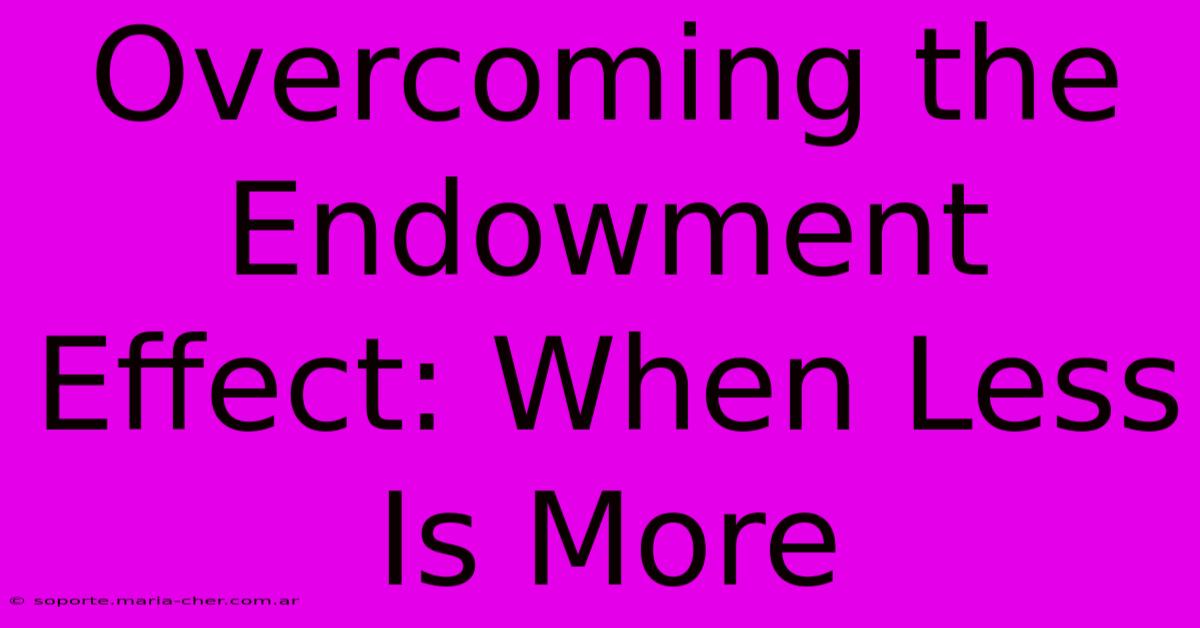Overcoming The Endowment Effect: When Less Is More

Table of Contents
Overcoming the Endowment Effect: When Less Is More
We've all been there. That feeling of intense attachment to something we own, even if it's objectively not worth that much. This is the endowment effect, a well-documented cognitive bias where we place a higher value on things simply because we possess them. Understanding and overcoming this effect is crucial for making rational decisions, whether it's selling a cherished item, negotiating a deal, or simply decluttering our lives.
What is the Endowment Effect?
The endowment effect, also known as the mere ownership effect, describes our tendency to overvalue what we own. This isn't simply about sentimental value; it's a psychological phenomenon that impacts our perception of worth. Think about it: you might be willing to pay $20 for a coffee mug in a store, but if you already own that mug, you might demand $40 or more to sell it. That extra $20 represents the inflated value created by ownership.
The Psychology Behind the Bias
Several factors contribute to the endowment effect:
- Loss Aversion: We feel the pain of a loss more strongly than the pleasure of an equivalent gain. Selling something feels like a loss, so we demand a higher price to compensate for that feeling.
- Cognitive Dissonance: If we sell something for less than we believe it's worth, we experience cognitive dissonance – the discomfort of holding conflicting beliefs. To avoid this, we inflate its value.
- Endowment as Identity: Sometimes, our possessions become intertwined with our sense of self. Selling them feels like losing a part of ourselves.
How to Overcome the Endowment Effect
Overcoming the endowment effect requires a conscious effort to detach from emotional attachments and focus on objective value. Here are some strategies:
1. Reframe Your Thinking
Instead of focusing on what you're losing by selling an item, concentrate on what you'll gain. Will the money allow you to buy something else you need or want more? Will it reduce financial stress? Shifting your perspective can lessen the pain of parting with something.
2. Consider Opportunity Cost
Every item we own represents an opportunity cost – the potential value of what we could have if we invested that resource differently. By acknowledging the opportunity cost, we can see the potential benefits of selling an item and using that money more productively.
3. Delay the Decision
The endowment effect is often strongest immediately after acquiring something. If possible, wait a while before making a decision to sell. This creates distance and allows for a more objective evaluation.
4. Seek External Opinions
Get feedback from unbiased sources. Ask a friend or family member to give you an honest assessment of the item's market value. This external perspective can help break the emotional ties you may have.
5. Practice Mindfulness
Mindfulness meditation can help you become more aware of your thoughts and feelings, allowing you to identify and manage the emotional attachments fueling the endowment effect. This can create space for more rational decision-making.
The Endowment Effect in Everyday Life
The endowment effect impacts various aspects of our lives, including:
- Negotiations: Understanding this bias allows you to negotiate more effectively, both when buying and selling.
- Investment Decisions: Holding onto underperforming assets because of emotional attachment is a common mistake driven by the endowment effect.
- Decluttering: Letting go of possessions can be liberating, but the endowment effect makes it challenging. Recognizing this bias helps us make better decisions about what to keep and what to let go of.
Conclusion:
The endowment effect is a powerful cognitive bias that can significantly impact our decisions. By understanding its underlying mechanisms and implementing the strategies outlined above, we can overcome this bias and make more rational, objective choices. Learning to detach from emotional attachments and focus on objective value is a key step towards achieving greater financial and emotional well-being. Remember, sometimes, less is truly more.

Thank you for visiting our website wich cover about Overcoming The Endowment Effect: When Less Is More. We hope the information provided has been useful to you. Feel free to contact us if you have any questions or need further assistance. See you next time and dont miss to bookmark.
Featured Posts
-
V60 Vs V90 Sd Cards The Battle Of The Titans Achieving Unprecedented Speeds And Reliability
Feb 07, 2025
-
Floral Elegance Without The Cost The Secret To Affordable Baby Breath
Feb 07, 2025
-
The Ultimate Sd Card Showdown V60 Vs V90 Which One Reigns Supreme
Feb 07, 2025
-
Elevate Your Email Signature Stunning Transition Images No Strings Attached
Feb 07, 2025
-
Unleash Limitless Creativity The Futura Now Trial Your Essential Tool For Typography Mastery
Feb 07, 2025
